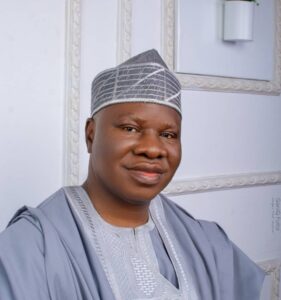

It is a matter of immense joy that a new kind of leadership is now emerging at a time when global uncertainties, moral shifts, and geopolitical crises demand more than conventional solutions.
 The new leadership, however, is one anchored, not in politics, power, or profit, but in prayer, purpose, and prophetic insights.
The new leadership, however, is one anchored, not in politics, power, or profit, but in prayer, purpose, and prophetic insights.
It is particularly striking that one of Nigeria’s leading voices in this emerging paradigm is Dr. Oluwatoyin Tajudeen Alabi, who is currently in Kaunas, Lithuania, attending the Global Leadership Prayer Summit under the aegis of the Full Gospel Business Men Fellowship International (FGBMFI) Global Forum.
Held in the historic city of Kaunas, noted as the spiritual heart of Lithuania, this summit is not just a gathering; it is indeed a convergence – a convergence of spiritual generals, marketplace apostles, national leaders, intercessors, and visionaries from across continents who believe that the destiny of nations can, and must, be shaped by divine counsel.
For Dr. Alabi, the journey to Lithuania is both a personal calling and a national responsibility.
He said: “This is more than just a summit, it’s a divine convergence of faith-driven leaders from around the world, seeking God’s face for the nations, exchanging ideas, and aligning purpose with prophetic direction.”
Representing Nigeria at this prestigious and epoch-making summit, Dr. Alabi carried more than just his personal convictions, but also the aspirations of a nation in search of healing, renewal, and visionary leadership.
As a man deeply involved in faith-based advocacy, community transformation, and public affairs, Dr. Alabi’s participation underscores an age-long belief among kingdom leaders, saying “when men pray, history shifts”.
With hundreds of delegates in attendance from Asia, Europe, Africa, and the Americas, the summit’s sessions focused on strategic intercessions, prophetic leadership, economic justice, kingdom entrepreneurship, and global missions. Workshops, plenaries, and roundtable forums echo with one central theme: “leadership must return to its spiritual roots if it is to address the complexities of the 21st century”.
As a matter of fact, Kaunas, the host city, was not an accidental venue. This former capital of Lithuania has a storied history of resistance, resilience, and revival. During World War II, it was a stronghold of underground resistance against Nazi forces.
Today, it is a beacon of spiritual reawakening in Eastern Europe. For participants, the setting reinforced the summit’s core message that emphasises that “once broken can become epicenters of global healing”.
As participants walked through the narrow cobblestone streets of Kaunas’ Old Town, visited historic cathedrals, and gathered in prayer-filled sessions, a powerful spiritual metaphor emerged.
Leadership, like Kaunas, must be both historical and prophetic, honouring the past while preparing the future.
Dr. Alabi reflected on this atmosphere with deep emotion, saying “being here is a reminder that no nation is too far gone for revival. No leader is beyond redemption. When purpose meets prayer, change is inevitable”.
One of the most striking features of the summit was its unapologetic call for spiritual leadership in the public square. The era of compartmentalised faith, where religion is restricted to Sunday mornings, is over. Leaders there argued that faith must be the foundation upon which policies are made, economies are built, and societies are reformed.
In his address to fellow delegates, Dr. Alabi emphasised the need for faith-rooted governance, kingdom economics, and righteous influence across sectors. Drawing from Nigeria’s experiences, he spoke about the importance of prophetic clarity in political decision-making and urged African leaders to embrace spiritual intelligence as a tool for national transformation.
“We cannot continue to separate governance from God,” he said.
“The crises we see today are not just political or economic. They are spiritual in origin, and spiritual problems require spiritual solutions.”
Interestingly, the summit could boast of an impressive line-up of speakers, including former presidents turned preachers, billionaires who now build churches, and policy-makers who double as pastors. The common thread is their willingness to submit their personalise influences to divine authority.
One of the summit’s keynote speakers, a former Eastern European Prime Minister-turned faith ambassador, recounted how divine guidance prevented his country from descending into civil war. Another delegate, an Asian business magnate, shared how his company’s decision to restructure its operations around kingdom principles led to unprecedented growth and impact.
For Dr. Alabi, these testimonies served as both inspiration and affirmation. “I’m not just here to listen, I’m here to build bridges,” he explained. “Nigeria has stories too. We’ve seen what prayer can do. I believe that by connecting with these global voices, we can co-create solutions rooted in godly wisdom.”
